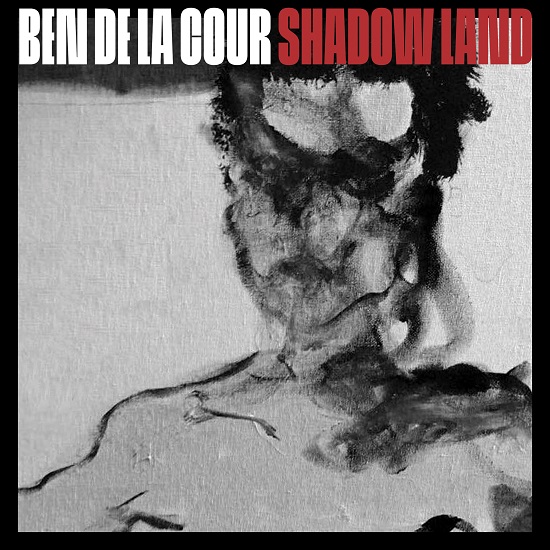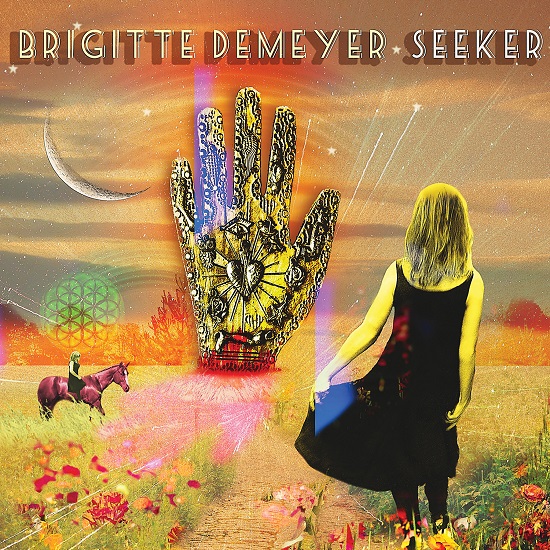
Authenticity’s something that’s often claimed but not always delivered. Not in this case; “Shadow Land” is a powerful and often disturbing collection of songs with a wide variety of themes. And the authenticity isn’t just in the lived experience of Ben de la Cour, although his life suffuses the songs. It’s also in the way the album was made; virtually all of it was recorded live. Brave, perhaps, but vibrant and raw when it’s done well. On “Shadow Land”, it’s done very, very well.
This isn’t a gentle, introspective album of reflective songs tinged with melancholy like Jackson Browne and James Taylor in the seventies. Their hell-raising generally didn’t make it directly into the songs (unless you count “Cocaine” on “Running on Empty”). With Ben de la Cour, it’s a different matter. It doesn’t matter how deep the barrel is, he’ll siphon out the most bitter dregs, then create potent songs from them. If you wanted a more current comparison, Ben has a lot in common with Michael McDermott both in the life lived and in the breadth of musical stylings they use to get the songs across.
“Shadow Land” moves effortlessly from the gentle triple-time pathos of another barely-mourned suicide in “Swan Dive” to the terrifying, hallucinatory “Harmless Indian Medicine Blues” sounding like a half-speed, minor key “Telegram Sam” played by Black Sabbath, with a side order of raw sax. And while we’re on the subject of terrifying, “Basin Lounge” is a full-on, full band romp through the story of a night in one of those bars that sensible people don’t visit, complete with cocaine references. It’s on the edge of falling apart at any time and conveys the stimulant headrush perfectly when the manic guitar solo kicks in.
The album isn’t just about the personal. There’s a smattering of murder ballads in there as well. The album opens with “God’s Only Son”, the tale of double-crossing bank robbers set to an Ennio Morricone-style arrangement, complete with whistling and mandolin while “Amazing Grace (Slight Return)” is a much more mellow take on a hushed-up murder in a small town. There’s also a takedown of corporate greed in the swamp-rock of “In God We Trust … All Others Pay Cash”, but the focus is mainly on the searingly honest depictions life in general and of the Janus faces of dependency and recovery in particular.
Two of the standouts in this vein are “The Last Chance Farm”, a gentle, bleak story of two characters meeting in rehab and the title song with its dystopic alienation and a perfect description of eternal damnation: ‘The Revolutionary Suicide Jazz Band plays all night long’. It certainly sounds a lot like Hell to me.
“Shadow Land” isn’t an easy listen; it’s not meant to be. It’s the product of a difficult life and Ben de la Cour doesn’t shy away from honest depiction of this life. The musical settings are perfect for the subject matter of the songs from the terrible clarity and Jack London references of “Valley of the Moon” to the raw rock and hedonism of “Basin Lounge”. You never know quite what’s coming next; it could be Townes Van Zandt, it could be Nick Cave. Whatever it is, it won’t be dull.
If you like your albums spiced with a murder ballad or two, a touch of the supernatural, terrifying stories of substance abuse, suicide, alienation, Armageddon and cross-dressing, then it’s your lucky day.
“Shadow Land” is released in the UK on Friday April 9th on Flour Sack Cape Records (FSCR-0010).
As a special treat, here’s the video clip for “Harmless Indian Medicine Blues”:

This interview was originally published in late 2019. Since then, we’ve all seen a few changes. We’ve given the site a bit of a spring clean and everyone and their sibling’s sharing archive material. We thought it would be a great opportunity to dust off some of our highlights and see how they’re looking (and sounding) now.
We’re kicking off with our first ever audio interview which we grabbed with Graham Parker before his gig at The Foxlowe Centre in Leek on a tour celebrating the fortieth anniversary of the release of his classic album “Squeezing Out Sparks”.
Allan McKay and Steve Jenner grabbed thirty minutes with Graham just after soundcheck and, as always, he was good value for his opinions and insights. The interview was edited for various local radio stations in the north-west but this is the full, uncut version. Just a warning, there’s one mild swear-word at about 9 minutes 15 seconds:

‘Learn something new every day’. Today’s was an absolute beauty; I discovered what a shuitar is. I won’t describe it because its creator, Jano Rix, does that in this piece of video:
Jano Rix is the co-writer for almost all of this album and plays percussion (including shuitar) and keyboards (including a bit of mellotron). However, the name on the sleeve, the voice (and what a voice it is) and the lived experience are very much Brigitte DeMeyer’s. There’s a little piece of pure invention here, but most of the songs are personal, whether that’s personal stories or personal viewpoints. The title’s appropriate, not just because of the song of that name but because there’s a strand of longing and melancholy running through its ten songs; longing for friends, longing for family, longing for truth and longing for familiar places.
But let’s start with the untypically humorous song because it links in neatly to the rest of the album. “Cat Man Do” has a loose jazz feel and a central character that could be the son (or grandson) of the Chuck E featured on Rickie Lee Jones’ first (and best-selling) single, “Chuck E’s in Love”. The song’s similar in style to the autobiographical “Ain’t No Mister” which also features a central character in the same mould as Chuck E; that’s jazzers for you. It’s difficult not to draw parallels between the vocal styles of Brigitte and Rickie Lee Jones; they can both sing with the delicacy of angels and produce a 4-packs-a-day growl when it’s needed.
The title song sounds like seventies Laurel Canyon, which is appropriate in a song about moving back to California and searching for truth, love and a friend or two. “Roots and Wings and Bones”, which follows “Seeker”, and closes the album, is a love song for Brigitte’s son, which might contain a little musical reference to “Bohemian Rhapsody” (or my imagination might be working overtime). The trilogy of very different love songs is completed by “Already In” for Brigitte’s husband and “Louisiana” (with a reference to the classic “Georgia On My Mind”) is about loving and missing New Orleans with an appropriate Big Easy arrangement and a few nods in the direction of Allen Toussaint.
It’s almost obligatory on an Americana album these days to have a political view or two; it’s a natural reaction to four turbulent years. The album’s laid-back opening song “All of the Blue” sings the praises of under-valued cowboys, while the bright honky-tonk of “Calamity Gone” skewers the politicians trying to claim spurious solidarity with working people. Yep, we know who they are and we have them in the UK as well; and I don’t see any swamps being drained on either side of the pond just yet.
“Seeker” is a fine piece of work. There’s plenty going on musically to keep the listener’s interest but it’s Brigitte’s highly personal lyrics that make the album a spiritual experience and privileged window into her life. And she also knows when to inject a bit of fun as well.
“Seeker” is released in the UK on Friday March 26th on BDM Records.
As a bonus, here’s a video shot for Bob Harris’s ‘Under the Apple Tree’ when Brigitte toured the UK with Will Kimbrough and Dean Owens in March 2017:
Update 02/03/21 – We’ve just discovered a video for the wonderful “Louisiana”:


